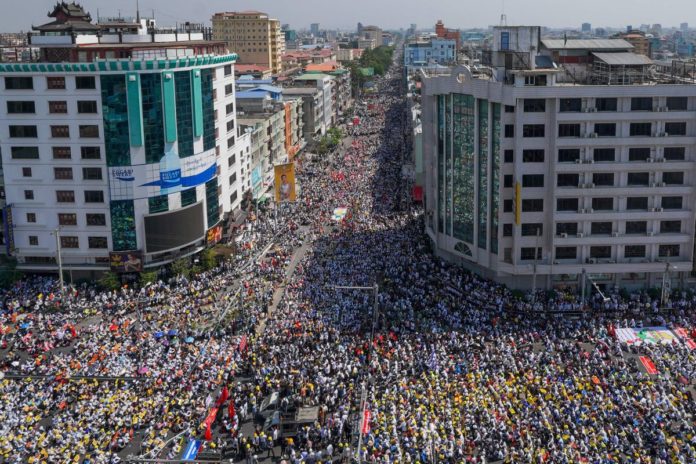On the morning of February 1st, 2021, the Burmese military detained members of Myanmar’s governing party the National League for Democracy in a coup d’état. Only existing as a democracy since 2011, the military coup has pushed the nation into a resurgence of previous autocratic rule. The military, declaring a national emergency, gave power to Tatmadaw Commander in Chief Min Aung Hlaing. While the government has fallen in ruin, citizens are protesting for their right to democracy and trying to resist the authoritarian rule imposed. Myanmar is in the hands of the military and no one knows what will happen to Myanmar’s democracy.
Following allegations of a fraudulent 2020 election, the military deployed troops to depose elected leaders. The parliament of Myanmar was scheduled to hold its first session since the election this month, where the National League for Democracy had won 83% of the available seats. The military didn’t accept these results, largely because NLD leader Aung San Suu Kyi had held her position of power since 2016. Aung San Suu Kyi was the state counselor of Myanmar and face of the National League for Democracy party. Her work towards bringing democracy to Myanmar has caused her to be immensely popular among citizens. Aung was once a globally renowned civil rights leader, even winning a Nobel Peace prize, but the abandonment of her values after gaining power has caused her to lose global support. It was expected that the parliament would endorse the results and approve the winning government, but before the coup the military had taken to the Supreme Court to argue the supposedly fixed election. It was there that they threatened to take action and even surrounded the houses of parliament with soldiers. The coup was officially announced on a military-owned TV station, where the news reporter read out a portion of the constitution allowing the military to declare a national emergency. He said that this national emergency would be in place for a year.
The military seized control quickly. They canceled domestic and international flights, suspended TV broadcasts, blocked telephone and internet access, and closed commercial banks as well as the stock market. In major cities, people could be seen lining up outside ATMs and stocking up on supplies. Since the coup, citizens all over Myanmar have staged protests and rallies, all fighting for a pro-democratic government. A woman at one of these protests was shot where the military denied using lethal force. The biggest protest was on February 3rd, when the charges against “the face of democracy” Aung San Suu Kyi, were announced. Thousands of citizens marched to show their support for State Counselor Suu Kyi. Although many protests of people fighting for democracy happen daily, 8pm curfews have been instituted, filling streets with military officials who begin to arrest political leaders and activists. Senior Gen. Min Aung Hlaing has released more than 23,000 inmates from prison, calling it an act of mercy to celebrate the country’s Union Day. Citizens are now torn between protecting themselves and fighting for the democracy they believe they deserve. But many are still pushing. They are coming up with ways to protect themselves while also resisting this imposed military rule. Although the president, Win Myint, was detained, the detainment creating the most talk is that of Aung San Suu Kyi. Although her global popularity has been lost, she is still widely popular in Myanmar. During the coup, Aung was detained and charged. On February 3rd, her party stated that she illegally imported communication devices, and the police are said to have found at least 10 illegal walkie-talkies in her home. This charge could leave her facing at least three years in prison. While it is a legal charge, many see this as a way for the military to keep Aung locked up and to justify her imprisonment.
